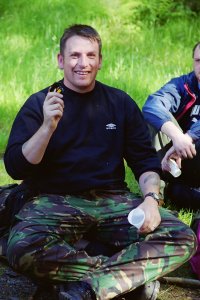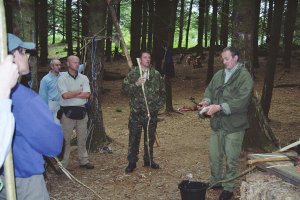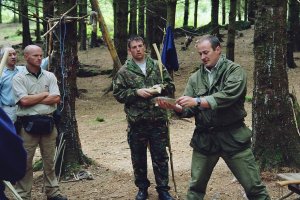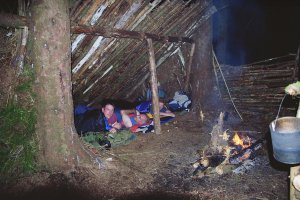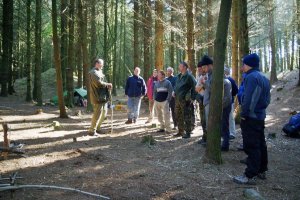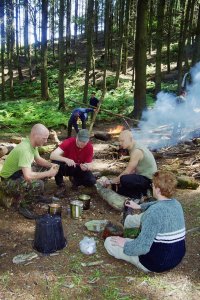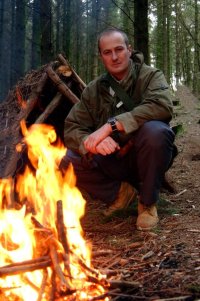I just thought folk might like to read a review of the Cambrian Survivals Basic Survival course I attended way back in 2004.
I wrote the review back then and it has been looking for a home ever since....
Remember - this was a Survival course, not a Bushcraft course.
I understand that Cambrian Survival are still running this course.
CAMBRIAN SURVIVAL
It was a mixed bunch of people who met in Aberystwyth one June evening to join the Cambrian Survival Basic Survival Course. Amongst our number were IT workers, drivers, college lecturers, an ex-soldier, a customs man and motor mechanics. Some with no outdoor experience, and some very experienced in hiking and hill-craft, the one unifying characteristic of the group being a desire to learn how to be safer in the outdoors, especially when things go wrong.
After being guided up a maze of narrow country lanes to the training area in the woods behind Aberystwyth, we gathered around a cheerful log fire, protected from the light rain by a parachute tipi and listened to a site safety and sanitation briefing from Mike Jarmain, Cambrian Survivals chief instructor.
Mike, an ex-Army Combat Survival Skills Instructor, established Cambrian Survival several years ago and, with popular interest in survival and bushcraft booming from media exposure such as the film Castaway and the BBCs Wildtracks, as well as TV programmes that have directly involved Mike as a consultant and star, it is going from strength to strength.
Although Mike spent 18 years in the Army, he is also a qualified civilian teacher and the courses are not all Rambo or Gung-ho but aim at providing Realistic Survival Training relevant to any environment worldwide, providing anyone, from beginner to seasoned outdoorsman, with the skills to survive when a trip goes wrong. To this end the courses, which run year round, are challenging, educational, and fun, and even the classroom sessions are held outdoors.
After a round of introductions, the Course started in earnest with talks on how to keep a trip safe with proper preparation (Mike produces his own very good trip plan sheets a superior version of the familiar route card idea); the priorities for survival (the will to live, food, fire, shelter etc), and recognising how the stress of a survival situation can affect you.
Even after a supper of thick, sustaining, soup and delicious homemade cake, things did not slow down and after being shown our accommodation (various designs of survival shelters built from local, natural materials) we returned for a talk and demonstration of night signalling (to call in potential rescuers) with various torches and light sources. We then had a go at moving through pitch dark woods without a torch, relying on senses other than sight (a very realistic scenario I have in the past lost the path at night, coming in off the hill later than intended with a broken torch. In the dark twigs, mini crags and roots all pose real threats!)
We got to bed at around midnight. The next morning, after a quick brew, we listened to a talk on, and demonstration of various tools that can be carried to make survival easier. The group then had the opportunity to build their own shelters before a break for another brew and the remains of the cake. Next came fire lighting with a talk, and demonstrations of various ways of making a flame other than the obvious matches and lighter, and the students also had a go at these skills.
The pace of the course never let up, with various techniques being taught (and tried out); exercises to open our eyes to using a survival mind set in observation and lateral thinking, and such skills as how to find North from the stars and sun, signalling with a heliograph (such as a shiny metal surface or an old CD), or lengths of fabric etc to attract the attention of rescuers such as a search and rescue helicopter, acquisition and preparation of wild food (leading to a meal cooked in old tin cans turned into cookpots by the students) and, on the Sunday, after a move down from the high woods to a wooded stream side location, the dangers of dehydration and drinking untreated water, followed by water purification, improvised survival tools and equipment - and much more.
The amount of information we received on this Basic 2-Day Survival Course was staggering, and if some of the information was more applicable to surviving for extended periods of time in the kind of wilderness that no longer exists in Wales, learning a lot of the techniques we looked at would leave you a lot more likely to come out of an incident on even tame hills happier and healthier than might otherwise be the case.
None of the course was fantastical or bogus. Mike and his assistant, Barney, were very clear and understandable in their teaching and very approachable (none of this I am a survival god and you will humbly listen in awe nonsense) and all the course members found the weekend fun, instructive and well structured. Yes, we were hungry; yes we were tired, but the instruction was to the point, the food adequate (the fresh scones provided on day 2 delicious) and everyone on the course was more than just happy. In fact many were reluctant to leave at the end of the two days, wished they were on the 5-day course and vowed to return.
One of the fun parts of the course was building and using an Apache Sweat Lodge type sauna, followed by a dip in the stream as a clean up before we all came away.
I have experienced several survival courses, as had the ex-soldier on the course, and we both rated Cambrian Survivals Basic 2-day course as pretty darned good.
I can recommend the course to anyone with the remotest interest in real survival training for situations that can arise on the simplest Welsh walk to international wilderness treks.
For more information contact
Cambrian Survival, PO Box 82, Aberystwyth, Ceredigion, SY23 1WH.
Tel. 01970 612969
www Cambriansurvival.co.uk
I wrote the review back then and it has been looking for a home ever since....
Remember - this was a Survival course, not a Bushcraft course.
I understand that Cambrian Survival are still running this course.
CAMBRIAN SURVIVAL
It was a mixed bunch of people who met in Aberystwyth one June evening to join the Cambrian Survival Basic Survival Course. Amongst our number were IT workers, drivers, college lecturers, an ex-soldier, a customs man and motor mechanics. Some with no outdoor experience, and some very experienced in hiking and hill-craft, the one unifying characteristic of the group being a desire to learn how to be safer in the outdoors, especially when things go wrong.
After being guided up a maze of narrow country lanes to the training area in the woods behind Aberystwyth, we gathered around a cheerful log fire, protected from the light rain by a parachute tipi and listened to a site safety and sanitation briefing from Mike Jarmain, Cambrian Survivals chief instructor.
Mike, an ex-Army Combat Survival Skills Instructor, established Cambrian Survival several years ago and, with popular interest in survival and bushcraft booming from media exposure such as the film Castaway and the BBCs Wildtracks, as well as TV programmes that have directly involved Mike as a consultant and star, it is going from strength to strength.
Although Mike spent 18 years in the Army, he is also a qualified civilian teacher and the courses are not all Rambo or Gung-ho but aim at providing Realistic Survival Training relevant to any environment worldwide, providing anyone, from beginner to seasoned outdoorsman, with the skills to survive when a trip goes wrong. To this end the courses, which run year round, are challenging, educational, and fun, and even the classroom sessions are held outdoors.
After a round of introductions, the Course started in earnest with talks on how to keep a trip safe with proper preparation (Mike produces his own very good trip plan sheets a superior version of the familiar route card idea); the priorities for survival (the will to live, food, fire, shelter etc), and recognising how the stress of a survival situation can affect you.
Even after a supper of thick, sustaining, soup and delicious homemade cake, things did not slow down and after being shown our accommodation (various designs of survival shelters built from local, natural materials) we returned for a talk and demonstration of night signalling (to call in potential rescuers) with various torches and light sources. We then had a go at moving through pitch dark woods without a torch, relying on senses other than sight (a very realistic scenario I have in the past lost the path at night, coming in off the hill later than intended with a broken torch. In the dark twigs, mini crags and roots all pose real threats!)
We got to bed at around midnight. The next morning, after a quick brew, we listened to a talk on, and demonstration of various tools that can be carried to make survival easier. The group then had the opportunity to build their own shelters before a break for another brew and the remains of the cake. Next came fire lighting with a talk, and demonstrations of various ways of making a flame other than the obvious matches and lighter, and the students also had a go at these skills.
The pace of the course never let up, with various techniques being taught (and tried out); exercises to open our eyes to using a survival mind set in observation and lateral thinking, and such skills as how to find North from the stars and sun, signalling with a heliograph (such as a shiny metal surface or an old CD), or lengths of fabric etc to attract the attention of rescuers such as a search and rescue helicopter, acquisition and preparation of wild food (leading to a meal cooked in old tin cans turned into cookpots by the students) and, on the Sunday, after a move down from the high woods to a wooded stream side location, the dangers of dehydration and drinking untreated water, followed by water purification, improvised survival tools and equipment - and much more.
The amount of information we received on this Basic 2-Day Survival Course was staggering, and if some of the information was more applicable to surviving for extended periods of time in the kind of wilderness that no longer exists in Wales, learning a lot of the techniques we looked at would leave you a lot more likely to come out of an incident on even tame hills happier and healthier than might otherwise be the case.
None of the course was fantastical or bogus. Mike and his assistant, Barney, were very clear and understandable in their teaching and very approachable (none of this I am a survival god and you will humbly listen in awe nonsense) and all the course members found the weekend fun, instructive and well structured. Yes, we were hungry; yes we were tired, but the instruction was to the point, the food adequate (the fresh scones provided on day 2 delicious) and everyone on the course was more than just happy. In fact many were reluctant to leave at the end of the two days, wished they were on the 5-day course and vowed to return.
One of the fun parts of the course was building and using an Apache Sweat Lodge type sauna, followed by a dip in the stream as a clean up before we all came away.
I have experienced several survival courses, as had the ex-soldier on the course, and we both rated Cambrian Survivals Basic 2-day course as pretty darned good.
I can recommend the course to anyone with the remotest interest in real survival training for situations that can arise on the simplest Welsh walk to international wilderness treks.
For more information contact
Cambrian Survival, PO Box 82, Aberystwyth, Ceredigion, SY23 1WH.
Tel. 01970 612969
www Cambriansurvival.co.uk

